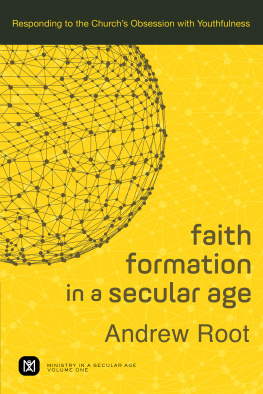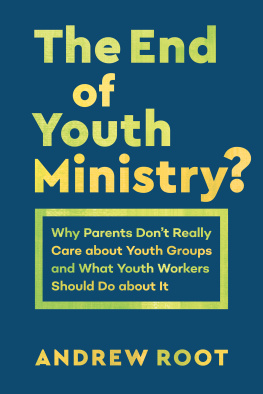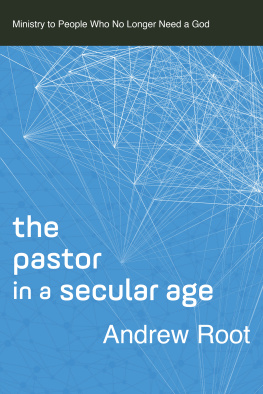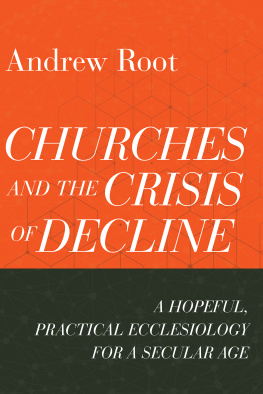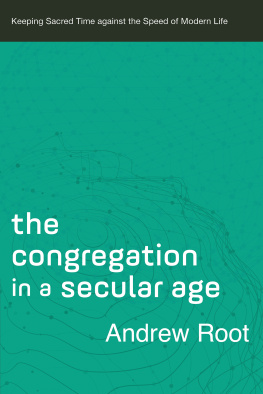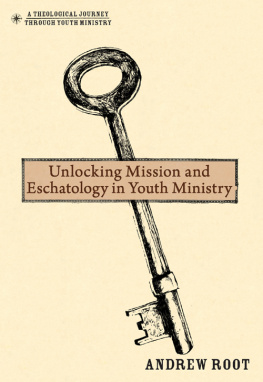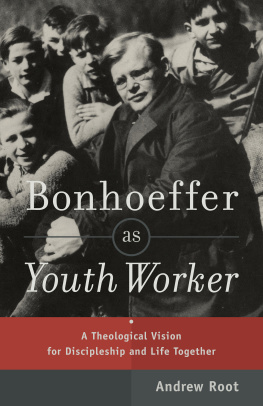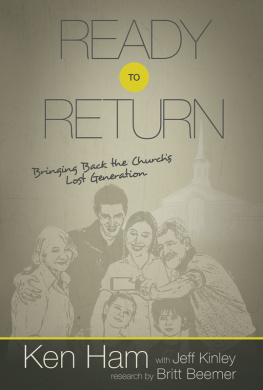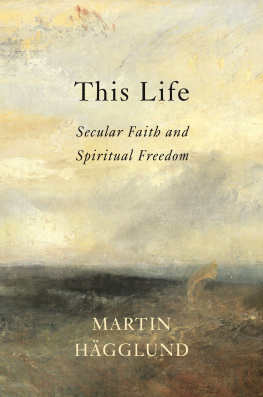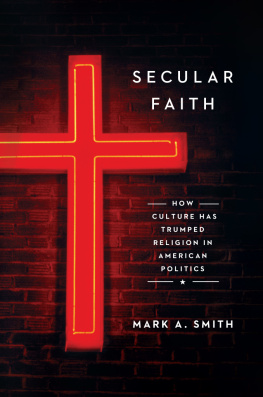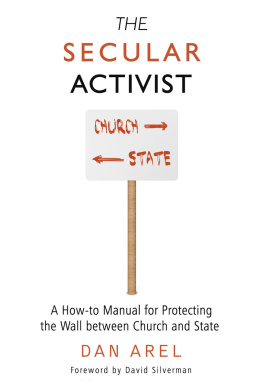Copyright Page
2017 by Andrew Root
Published by Baker Academic
a division of Baker Publishing Group
PO Box 6287, Grand Rapids, MI 49516-6287
www. bakeracademic.com
Ebook edition created 2017
All rights reserved. No part of this publication may be reproduced, stored in a retrieval system, or transmitted in any form or by any meansfor example, electronic, photocopy, recordingwithout the prior written permission of the publisher. The only exception is brief quotations in printed reviews.
Library of Congress Cataloging-in-Publication Data is on file at the Library of Congress, Washington, DC.
ISBN 978-1-4934-1031-6
Unless otherwise indicated, Scripture quotations are from the Revised Standard Version of the Bible, copyright 1952 [2nd edition, 1971] by the Division of Christian Education of the National Council of the Churches of Christ in the United States of America. Used by permission. All rights reserved.
Scripture quotations labeled NRSV are from the New Revised Standard Version of the Bible, copyright 1989, by the Division of Christian Education of the National Council of the Churches of Christ in the United States of America. Used by permission. All rights reserved.
Scripture quotations labeled NASB are from the New American Standard Bible, copyright 1960, 1962, 1963, 1968, 1971, 1972, 1973, 1975, 1977, 1995 by The Lockman Foundation. Used by permission.
Endorsements
Andy Root expands youth ministrys view and refocuses the conversation where it needs to beon divine action, justification, faith, faith formation, and personhood. If you are a ministry leader, here is vision and language for youth ministry you must consider. If you are a seasoned youth worker with a sneaking suspicion that theres more to your work, read this. If you are an aspiring youth worker, put this on your core reading list.
Steven Argue , Fuller Youth Institute, Fuller Theological Seminary
Andy Root takes another theological turn by identifying philosopher Charles Taylor as a yet unheard prophetic voice for the church. This book is sure to exercise our imaginations and reframe our perpetual quests for a saving faith formation paradigm by advocating for our only hopethe divine encounter.
Sharon Galgay Ketcham , Gordon College
Since Root first challenged the church to revisit relational youth ministry, his works have led readers on a pilgrimage into an ever deeper understanding of incarnational ministry. This volume brings the rich fruits of that pilgrimage into sharp and accessible focus. Working from a deep engagement with Charles Taylors diagnosis of how the secular age has yielded notions of faith without encounter, transcendence, or transformation, Root offers the church a glittering vista of faith and ministry recentered on the transcendent encounter with Christ who comes to transform. If you are in seminary, you will want to add this to your canon of must-reads. If you are a youth worker, this volume offers you both fresh inspiration and a prescriptive way forward to a ministry that truly transforms.
Skip Masback , Yale Youth Ministry Institute, Yale Divinity School
Andrew Root has become an iconic figure in youth ministry globally. In him, youth ministry has reached a pinnacle of scholarship, finding its sociocultural identity and theological hope. In this book, he leads readers into the thorny brambles of Charles Taylors ponderous philosophical account of secularity, through which youth ministry may be viewed as a fetishized site of authenticity, a front for the modern selfa construction of Deism and Freudian libidinal liberation. With a little help from Taylors notion of transcendence, Root offers a corrective to mere authenticity in a kenotic theology that views Christian formation not as affiliation but as union in Christ in ministry. More than any living writer, Root has sparked the theological imagination of a generation of youth ministers. In a field of practice notorious for tips, tricks, and techniques this book promises not an easy way forward but one faithful nonetheless.
David F. White , Austin Presbyterian Theological Seminary
Dedication
To Kenda Creasy Dean
Your friendship, example, and witness
have formed me as a scholar and a teacher.

To Richard Osmer
(on your approaching retirement)
Your vision for formation
stretches deep and wide.
Contents
Cover
Title Page
Copyright Page
Endorsements
Dedication
Preface
Introduction: Bonhoeffer Thinks Were Drunk
Part 1: A History of the Age of Authenticity: The Challenge of Forming Faith
1. The Boring Church and the Pursuit of Authenticity
2. The History of Youthfulness
3. The Perceived Scam of the Mass Society
4. The Rise of the Hippie and the Obsession with Youthfulness
5. The Rise of Hip
6. Churches Filled with Bobosthe Beasts of Authenticity
Part 2: A Secular Age Meets Paul, and the Youthful Spirit Meets the Spirit of Ministry
7. Faith and Its Formation in a Secular Age
8. What Is Faith?
9. From Membership to Mystical Union
10. The Music of Formation
11. Is God a Favor Bestower or Gift Giver?
Conclusion: Practical Steps to Consider as the Household of Ministry
Index
Back Cover
Preface
The transition must have felt shockingly similar but so jarringly different. Imagine going to bed on October 4 and waking up on October 15. With just one eight-hour sleep you lost ten days. You can imagine workers, paid by the day, werent happy. This was money out of their pockets. And everyone was frightened. People wondered what it meant that ten days could have just disappeared . Days had been so dependable and now, in a flash, ten of them were gone. People couldnt get their minds off the loss.
This isnt a scene from a sci-fi movie; it actually happened in 1582. The genius mathematician Christopher Clavius discovered an error in the Julian calendar. This miscalculation put the calendar off by 0.002 percent per year. This doesnt seem like much, but Clavius realized that it had amounted over the years to ten full days. These small, almost unseen changes had put things off by more than a week. So under the leadership of Pope Gregory XIII, a new calendar, bearing the popes name, was unveiled. People went to sleep on October 4 of the Julian calendar and woke up on October 15 of the Gregorian calendar. This was a huge change.
We live in the middle of our own transition as we experience the shifting of the framework in which the Western world has been built. Most of us dont realize that we are living with a new calendar. Like people in the sixteenth century, we seem to be more concerned with what weve lost than with the fact that the whole calendar has shifted. This shift can be best summarized by a historical question posed by Charles Taylor, a question that peers back right to the time of Pope Gregory and the Protestant Reformation. Taylor asks, Why was it virtually impossible not to believe in God in, say 1500, in our Western society, while in 2000 many of us find this not only easy, but even Taylors question points to a huge, calendar-like transition in our world; we now live in a time when the experience of God is contested and to many (even those who still believe) doubtable.
And yet, like people in the sixteenth century, we seem to have our minds more on what has been lost than on this whole new calendar of our secular age. We are deeply concerned by the loss of church members, the loss of young people from youth groups, and the vitality of our institutionsbig concerns, no doubt, but concerns that cant really be addressed until we recognize that we are in a new time.

